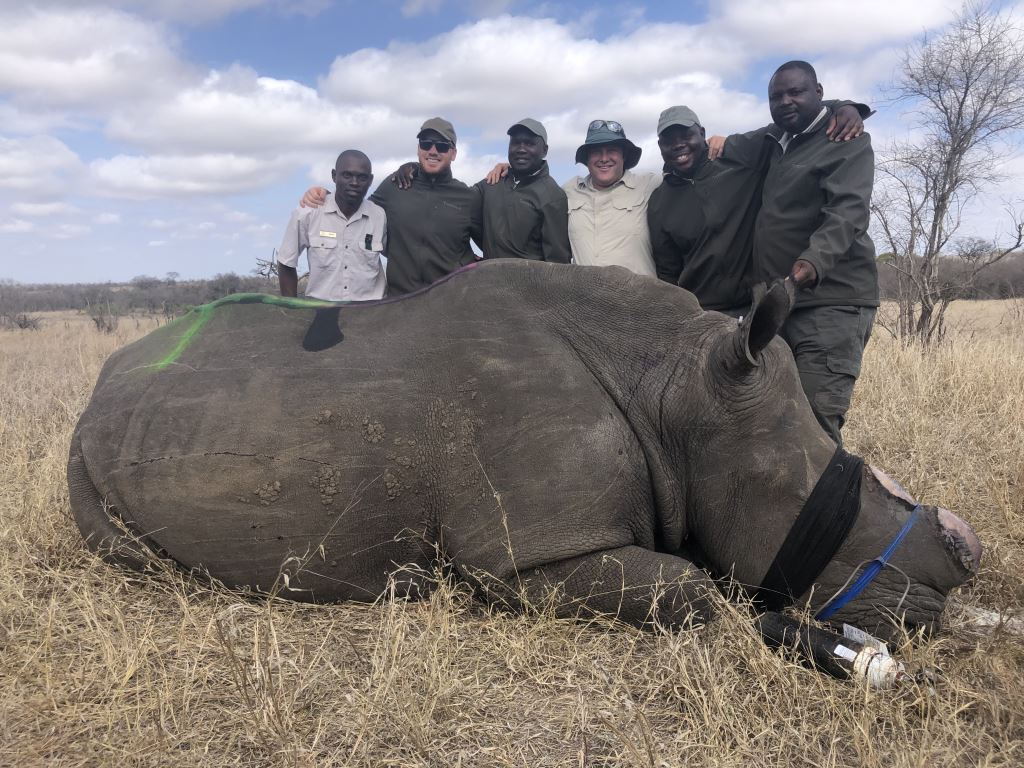Tintswalo Safari Lodge has launched a multi-faceted programme to strengthen rhino conservation efforts in the Manyeleti Game Reserve bordering the Kruger Park, the Timbavati and Sabi Sand game reserves.
Game rangers from Tintswalo Safari Lodge raised R33 000 towards the cost of DNA sampling and the safe dehorning of rhino in the Manyeleti. The pre-emptive safe removal of a rhino’s horn is one of the drastic but highly effective conservation management tools applied to deter poachers.

Children from the nearby schools and Tintswalo guests participated in this collaboration between the Mpumalanga Tourism and Parks Agency (MTPA), the Greater Kruger Environmental Protection Foundation (GKEPF), GRU-Wing, Flying for Freedom South Africa and Tintswalo Safari Lodge.
Tintswalo’s war on rhino poachers includes:
- Educational campaigns, training workshops and participation in environmental and rhino campaigns in the area.
- Funding and support for anti-poaching interventions in the Manyeleti Game Reserve, Greater Kruger National Park, and South African Wildlife College (SAWC) initiatives. Specific projects include the ‘Eye in the Sky’ Bathawk Programme; Wildlife Guardianship/Anti-Poaching Field Ranger Training and the K9 Anti -Poaching Project.
- Creating awareness among guests and international tourists who visit the area and facilitating generous donations from philanthropic individuals towards various anti-poaching programmes.
- Working with the local communities, private companies and government departments.
The Tintswalo Safari Lodge project sets out to educate the youth and create an understanding of the relationship between the game reserve, eco-tourism and lodges, South Africa’s natural heritage, the community, and jobs.
To date, the programme has reached about 2500 school pupils from the 19 communities surrounding the Manyeleti. Once a week, Tintswalo Safari Lodge collects 12 school children plus their teacher and drives them to the Manyeleti Game Reserve where they are treated to lunch and a game drive. Some children have never seen the wild animals they live so close to, and many have never been inside the game reserve where so many of their parents work.
After the game drive, the children attend a workshop about rhino conservation, the rhino poaching crises and the link between the tourism industry and jobs. Each child receives a certificate as an anti-rhino poaching activist, before they return to school.
South Africa’s grim rhino poaching legacy
- From 2007-2014 South Africa experienced a growth of more than 9,000% in rhino poaching.
- In the last decade, 8,889 South African rhinos have been lost to poaching.
- Despite increased anti-poaching initiatives, the Department of Environmental Affairs announced in August 2019 that 318 rhinos were poached in the first six months of the year.
- Most illegal activity occurs in Kruger National Park, which consistently suffers heavy poaching losses.
- A rise in incidents outside Kruger Park points to the growing sophistication of poaching units that are gaining a wider geographical coverage and expanding their operations across borders.
- Poaching syndicates are well-equipped, highly-organised and dangerous. They use helicopters, machine guns, veterinary immobilisation drugs and other sophisticated methods to stalk and kill rhinos to hack off and sell their horns.


